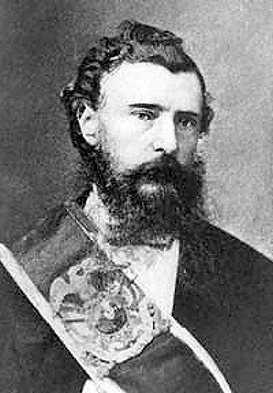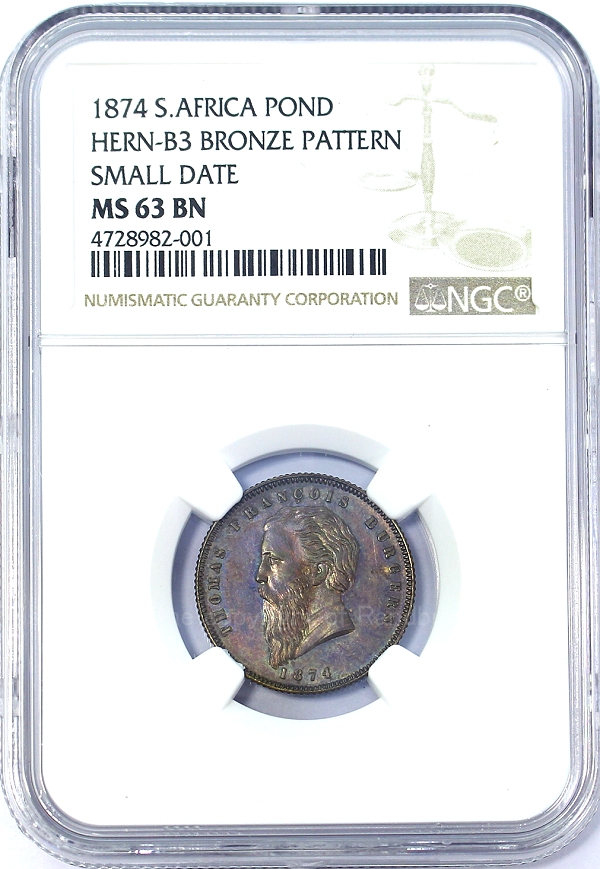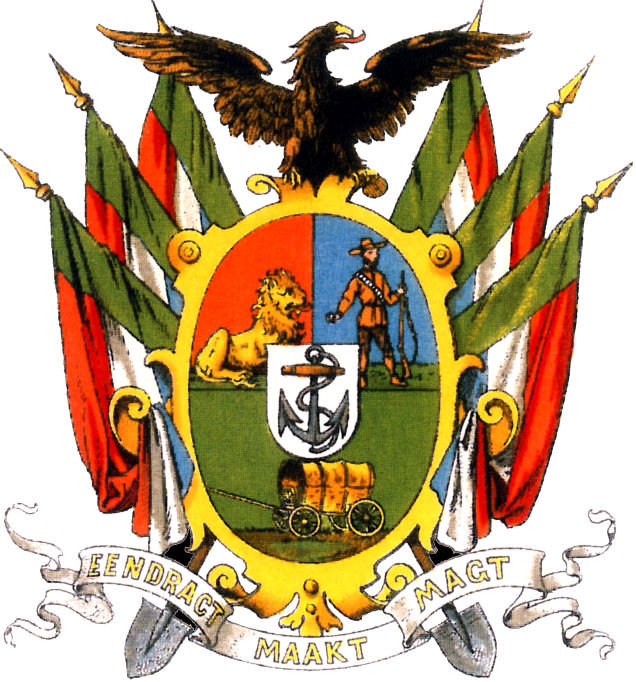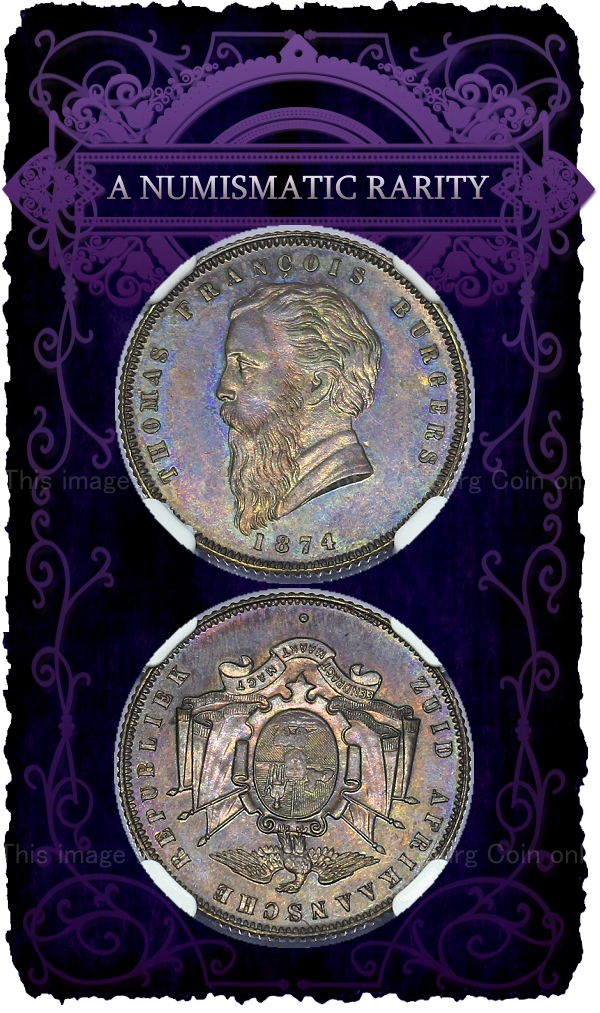1874 RARE South African Bronze Pond Pattern Piece Small Date Type
 ref:20220520 FANTASTIC FRIDAY OFFERS
DEAR COLLECTORS
CHOICE NUMISMATICS
WITH ADDED VALUE BY
BEING SLABBED AND GRADED
A SUPREME
NUMISMATIC FIND
B3 TYPE RARE PATTERN PIECE SOUTH AFRICAN COINAGE A
SOUGHT-AFTER
COLLECTORS COIN ----------------------------------------------------------------------------------------
 1874
PRESIDENT BURGERS
BRONZE
POND PATTERN PIECE
COIN STRUCK
TYPE B3: SMALL DATE
CLOSED 4 IN THE DATE 1874 ON THE
REVERSE OF THE PATTERN WITH NO FULLSTOP
A RARE NUMISMATIC STRIKE
 NGC GRADED: MS 63 BROWN VARIAGATED MAHOGANY BROWN SURFACES WITH IRRIDESCENT PATINA UNDER DIRECT LIGHTING MINTAGE: APPEARS TO BE 1 ONLY OF 2 GRADED SMALL DATE BROWN BY NGC A CHOICE-GRADED PATTERN  HISTORY IN YOUR HANDS
A BEAUTIFUL NGC GRADED COIN
A SUPERB RARITY FOR YOUR COLLECTION
GET THIS HARD TO FIND COIN
OF THE REPUBLIC OF SOUTH AFRICA'S
EARLY COINAGE HISTORY
 This image is the copyright of Randburg Coin only
INTENSE EYE-APPEAL
THIS BRONZE PATTERN PIECE IS USUALLY NOT AVAILABLE TO THE INTERNATIONAL NUMISMATIC MARKET AND CAN BE DESCRIBED AS RARE
SAMPLE PIECES AND WERE TENDERED TO SOLICIT BUSINESS AND NO CIRCULATION COINS WERE EVER STRUCK FROM THIS SERIES
EXTREMELY RARE TRANSVAAL
COLLECTION COINAGE
THIS 1874 PATTERN POND AS
SEEN ABOVE IS REGARDED AS A
!!! SCARCE !!!
CHOICE NUMISMATIC ITEM INTERNATIONALLY
THIS IS A LIMITED UNIQUE OFFER
NOW AT A PREFFERED PRICE
R 375 000
A COIN NOT OFTEN FOUND IN THE MARKETPLACE
CHOICE HIGH GRADE COINS ARE SOLD AT PRICES MUCH
HIGHER THAN THE CATALOGUED PRICES
--------------------------------------
Details:
Pattern - Mass: 4.27 grams Diameter: 22.20 mm Metal: Bronze
Obverse Design: The head of President Francois Burgers (Fine Beard)
Reverse Design: Transvaal full Coat of Arms with the inscription
ZUID AFRIKAANSCHE REPUBLIEK
--------------------------------------
Information:
Thomas François Burgers (15 April 1834 – 9 December 1881) was a South African politician and minister who served as the 4th president of the South African Republic from 1872 to 1877. He was the youngest child of Barend and Elizabeth Burger of the farm Langefontein in the Camdeboo district of Graaff Reinet, Cape Colony.
After studying theology at the University of Utrecht in the Netherlands, Burgers became the parson of Hanover, South Africa, in 1859. A charmingly eloquent, but fiercely individualistic man, he had been influenced by Professor C. W. Opzoomer in the Netherlands and embraced his rationalist, liberal ideas.
Burgers quickly became involved in a stormy controversy with the Dutch Reformed synod over his alleged liberalism and disbelief in the literal truth of the Bible. He was critical of traditional culture and strongly emphasised knowledge and rationalism. In 1862, his unorthodox doctrine brought on him an accusation of heresy, and in 1864, he was found guilty by the Synod and suspended. The Supreme Court overturned the decision, and in 1865, he was readmitted to the ministry. Some of his liberal theological ideas and his diverting viewpoints can be found in the sketches
he wrote about daily life in Hanover.
The burghers of the South African Republic urged Burgers to stand for the presidency, and he was elected by the considerable majority of 2,964 to 388 in 1872.
The South African Republic's first coins, the Burgerspond, were introduced by Burgers in 1874, responding to a demand for coinage from the populace dating back to 1853. Burgers sent a portrait of himself to his UK consul-general, who commissioned the coins to be struck at Heaton's Mint in Birmingham, England. Some people in the South African Republic objected to the issue of the Burgerspond, because the portrayal of the president on coins likened him to a dictator.
The 1905 New International Encyclopedia described Burgers's policies as president as "characterized by brilliant but impracticable schemes, aiming chiefly at territorial expansion." One of his plans, inspired by the neighbouring Cape Prime Minister John Molteno's massive railway programme, was to build a railway linking the Transvaal to the sea. In 1875 he traveled to Europe to raise funds, but his plans were thwarted by the Pedi chief Sekhukhune, whose lands lay in the path of the proposed railway.
By 1877, Burgers was very unpopular and his government was insolvent. Britain, keen on expanding their empire, stepped in and annexed the Transvaal. Burgers retired from political life, settled in the Cape Colony again, and died in 1881, only forty-seven years old, and leaving his family destitute. Coming to the family's aid, Burgers's former private secretary, Th.M. Tromp, published the sketches Burgers had written about his experiences as minister in Hanover. The proceeds of the book, in Dutch and published in the Netherlands, were used to alleviate his family's financial problems. He was a South African Freemason. He ended his days disheartened and in poverty. His body was disinterred in 1895, to be reburied in the Pretoria cemetery now known as the Heroes' Acre.
------------------------------------------------
TO RESERVE
Call Marketing Now (011) 789-2233 or (011) 789 -2234 Or email us by clicking on This email address is being protected from spambots. You need JavaScript enabled to view it.
This offer expires on the27th May 2022- and/or subject to availability.
E & OE - Subject to our terms and conditions.
NB: Payment options we accept for this promotion are:
Bank transfer (EFT) or cash ONLY.
SHIPMENT IS TO BE ARRANGED BY AGREEMENT
We are POPIA Compliant
------------------------------------------------
|






